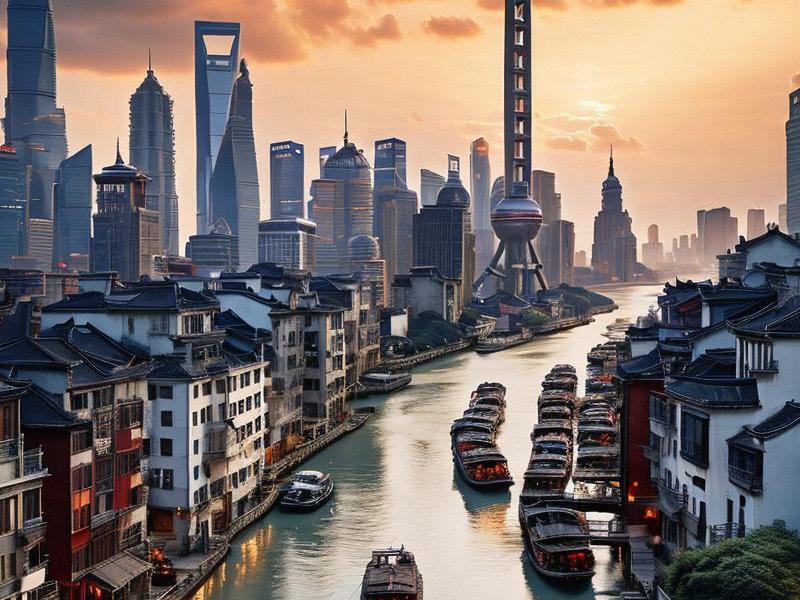This article delves into the multifaceted aspects of Shanghai, exploring its rapid urban development, cultural fusion, economic prowess, and increasing global influence. As one of the most dynamic cities in the world, Shanghai continues to evolve, offering a unique blend of tradition and modernity.

Nestled along the eastern coast of China, Shanghai stands as a beacon of progress and innovation. Known as the "Pearl of the Orient," this metropolis has transformed from a modest fishing village into a global financial hub within a mere century. Its story is one of relentless growth, cultural assimilation, and economic ascendancy.
The Urban Marvel: Shanghai's Skyline
Shanghai's skyline is a testament to its architectural ingenuity and urban planning prowess. The city boasts an array of iconic structures that have redefined the urban landscape. At the heart of it all lies the Bund, a historic waterfront area that showcases a harmonious blend of colonial-era buildings and modern skyscrapers. The juxtaposition of these structures reflects Shanghai's ability to preserve its rich history while embracing the future.
The Oriental Pearl Tower, with its striking design, serves as a symbol of Shanghai's technological advancements. Standing at 468 meters tall, it is one of the tallest structures in China and offers breathtaking views of the city. Nearby, the Shanghai Tower, the tallest building in China and the second-tallest in the world, showcases cutting-edge engineering and design.
Cultural Fusion: A Melting Pot of Traditions
Shanghai's cultural identity is a rich tapestry woven from diverse influences. The city has long been a crossroads of cultures, attracting merchants, missionaries, and immigrants from around the globe. This cultural fusion is evident in its architecture, cuisine, and arts.
爱上海论坛 The French Concession, a historic district with cobblestone streets and tree-lined boulevards, is a living museum of European architecture. Here, one can find charming cafes, boutique shops, and art galleries that exude an old-world charm. Similarly, the Yu Garden, a classical Chinese garden, offers a serene escape from the bustling city, with its meticulously landscaped ponds, rockeries, and pavilions.
Shanghai's culinary scene is equally diverse, reflecting its cosmopolitan nature. From traditional Shanghainese dishes like xiaolongbao (soup dumplings) and shengjianbao (pan-fried buns) to international cuisines, the city's restaurants cater to a wide range of tastes. The vibrant night markets and food streets are a testament to the city's culinary diversity and the joy of communal dining.
Economic Powerhouse: A Global Financial Hub
Shanghai's economic growth has been nothing short of remarkable. Over the past few decades, it has emerged as one of the world's leading financial centers, rivaling even New York and London. The city's strategic location, robust infrastructure, and business-friendly environment have attracted numerous multinational corporations and financial institutions.
The Shanghai Stock Exchange, one of the largest in the world, plays a pivotal role in the global economy. The city's free trade zones and innovative policies have fostered a thriving business ecosystem, encouraging entrepreneurship and innovation. Shanghai's Pudong district, once a rural area, has transformed into a modern financial district, home to the iconic Lujiazui skyline.
The city's economic success is not limited to finance; it also boasts a strong manufacturing base and a burgeoning technology sector. Shanghai is at the forefront of China's digital transformation, with companies like Alibaba, Tencent, and ByteDance making significant contributions to the global tech landscape.
上海水磨外卖工作室
Global Influence: A City of Opportunities
Shanghai's global influence extends far beyond its economic achievements. It is a hub for international diplomacy, hosting numerous global summits and forums. The city's cosmopolitan nature and openness to the world make it an ideal venue for fostering international cooperation and understanding.
Culturally, Shanghai has become a center for art, fashion, and design. The city hosts numerous international exhibitions, fashion shows, and cultural festivals, attracting artists, designers, and enthusiasts from around the globe. The Shanghai International Film Festival, one of the oldest and most prestigious film festivals in Asia, showcases the city's commitment to the arts.
Shanghai's education system is also a key driver of its global influence. The city is home to several world-class universities and research institutions, attracting students and scholars from around the world. These institutions play a crucial role in fostering innovation and advancing knowledge in various fields.
Challenges and the Road Ahead
爱上海419 Despite its many achievements, Shanghai faces several challenges as it continues to grow and evolve. The rapid urbanization has led to issues such as traffic congestion, air pollution, and housing shortages. The city government has implemented various measures to address these challenges, including the expansion of public transportation, the promotion of green energy, and the development of affordable housing.
Another challenge is maintaining the balance between economic growth and environmental sustainability. Shanghai is taking proactive steps to reduce its carbon footprint and promote sustainable development. The city has set ambitious targets for renewable energy adoption and waste management, aiming to become a model for sustainable urban living.
As Shanghai looks to the future, it remains committed to its vision of becoming a global leader in innovation, culture, and sustainability. The city's resilience, adaptability, and entrepreneurial spirit will undoubtedly drive its continued success.
Conclusion
Shanghai's journey from a small fishing village to a global metropolis is a story of extraordinary transformation. Its dynamic urban landscape, cultural fusion, economic prowess, and global influence make it a city of endless possibilities. As Shanghai continues to evolve, it serves as a model for other cities around the world, demonstrating the potential of human ingenuity and determination.
In exploring the chronicles of Shanghai, we gain a deeper appreciation for the complexities and contradictions of urban life. The city's ability to balance tradition and modernity, local and global, reflects the broader challenges and opportunities facing cities worldwide. Shanghai's story is not just about its past and present but also about its future, offering valuable lessons for the cities of tomorrow.